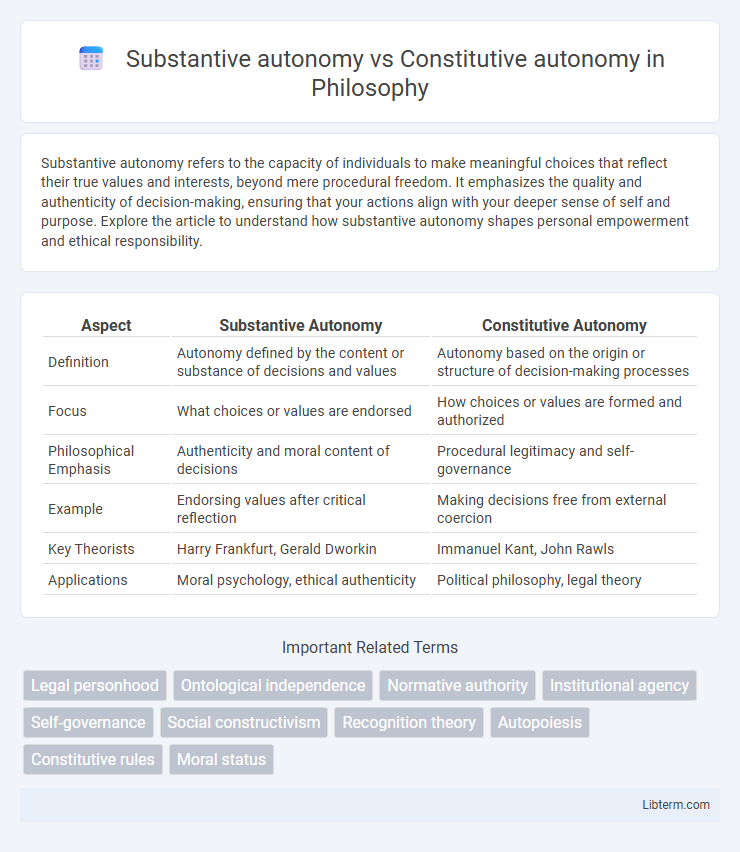Substantive autonomy refers to the capacity of individuals to make meaningful choices that reflect their true values and interests, beyond mere procedural freedom. It emphasizes the quality and authenticity of decision-making, ensuring that your actions align with your deeper sense of self and purpose. Explore the article to understand how substantive autonomy shapes personal empowerment and ethical responsibility.
Table of Comparison
| Aspect | Substantive Autonomy | Constitutive Autonomy |
|---|---|---|
| Definition | Autonomy defined by the content or substance of decisions and values | Autonomy based on the origin or structure of decision-making processes |
| Focus | What choices or values are endorsed | How choices or values are formed and authorized |
| Philosophical Emphasis | Authenticity and moral content of decisions | Procedural legitimacy and self-governance |
| Example | Endorsing values after critical reflection | Making decisions free from external coercion |
| Key Theorists | Harry Frankfurt, Gerald Dworkin | Immanuel Kant, John Rawls |
| Applications | Moral psychology, ethical authenticity | Political philosophy, legal theory |
Introduction to Autonomy in Philosophy and Law
Substantive autonomy refers to the capacity of individuals to make authentic decisions aligned with their core values and desires, reflecting true self-governance in both philosophy and law. Constitutive autonomy emphasizes the structural conditions and rules that enable individuals to exercise their autonomy within a legal or social framework, ensuring the legitimacy of autonomous actions. Understanding the distinction between substantive and constitutive autonomy is essential for analyzing how legal systems balance personal freedom with societal order.
Defining Substantive Autonomy
Substantive autonomy refers to the capacity of an individual or entity to make decisions based on internal values, beliefs, and reasons, reflecting true self-governance. It emphasizes authentic self-determination where choices align with deeply held principles rather than external influences or mere procedural freedom. In contrast to constitutive autonomy, which focuses on the formal structures enabling decision-making processes, substantive autonomy highlights the content and quality of those decisions.
Understanding Constitutive Autonomy
Constitutive autonomy refers to the foundational capacity of an agent or system to constitute its own identity, rules, and values, enabling self-governance and operational closure within a given environment. This form of autonomy emphasizes the internal processes that generate and maintain the system's organization, distinguishing it from substantive autonomy, which focuses on the freedom to make decisions or act independently. Understanding constitutive autonomy requires analyzing how systems co-produce their boundaries and define their components, leading to sustained self-determination and distinctiveness.
Key Differences Between Substantive and Constitutive Autonomy
Substantive autonomy refers to the actual capacity to make independent decisions and act upon them, emphasizing practical self-governance and control over one's choices. Constitutive autonomy involves the foundational framework or conditions that enable autonomy, including social, legal, or institutional structures that recognize and protect an individual's ability to be autonomous. Key differences lie in substantive autonomy's focus on action and decision-making capability, whereas constitutive autonomy centers on the systemic and normative prerequisites that allow autonomy to exist.
Historical Perspectives on Autonomy Concepts
Historical perspectives on autonomy reveal substantive autonomy as the capacity to make independent choices aligned with personal values, rooted in Enlightenment ideas emphasizing individual freedom. Constitutive autonomy, emerging from Kantian philosophy, focuses on the self's role in forming its own identity and moral framework through rational deliberation. These concepts evolved through socio-political shifts, influencing modern debates on personal agency and moral responsibility in philosophical and legal contexts.
Substantive Autonomy in Legal and Ethical Contexts
Substantive autonomy in legal and ethical contexts emphasizes an individual's capacity to make informed, independent decisions based on personal values and reasoning, rather than merely having formal rights or procedural freedom. It involves the depth of self-governance where choices reflect authentic preferences and moral understanding, crucial in areas like medical consent and criminal responsibility. Courts and ethical frameworks prioritize substantive autonomy to ensure respect for persons by acknowledging internal capacities, not just external permissions.
Constitutive Autonomy in Social and Political Theory
Constitutive autonomy in social and political theory emphasizes the role of collective self-determination in shaping political institutions and social norms, underscoring the foundational processes by which communities constitute their own identities and governance structures. This form of autonomy is distinguished by its focus on the collective capacity to define social meanings and rules, rather than merely individual freedom of choice or action. The concept is central to theories of democratic legitimacy and participatory governance, where the authentic expression of collective will is essential for just and effective political authority.
Implications for Personal Freedom and Agency
Substantive autonomy emphasizes the capacity to make authentic choices aligned with one's core values and identity, directly impacting personal freedom by fostering self-determined action. Constitutive autonomy concerns the foundational structures and conditions that enable the formation of those choices, shaping the context in which agency is exercised. The interplay between these forms of autonomy highlights that true personal freedom requires both authentic self-governance and the systemic conditions that support the development of independent agency.
Contemporary Debates: Substantive vs Constitutive Autonomy
Contemporary debates on substantive versus constitutive autonomy emphasize the distinction between autonomy as self-governance rooted in individual capacities and autonomy as socially constructed through institutional and relational frameworks. Substantive autonomy is often linked to moral and rational self-determination, highlighting personal agency and ethical responsibility. Constitutive autonomy examines the foundational social, cultural, and political conditions that enable or restrict autonomous action, stressing the importance of external structures in shaping individual freedoms.
Conclusion: Relevance and Future Directions
Substantive autonomy emphasizes the capacity for self-governance through meaningful and informed decision-making, while constitutive autonomy focuses on the foundational structures enabling such agency. Understanding the interplay between these concepts is crucial for enhancing legal and ethical frameworks that support individual rights and societal norms. Future research should explore integrating technological advancements and cultural diversity to expand the practical applications and theoretical robustness of autonomy in complex social contexts.
Substantive autonomy Infographic

 libterm.com
libterm.com